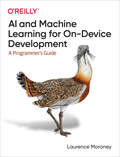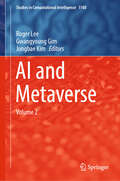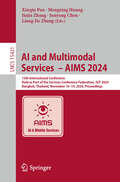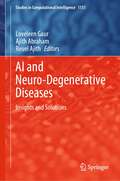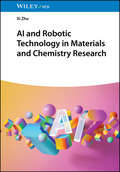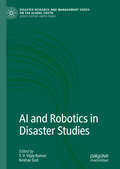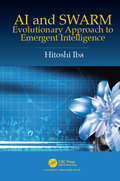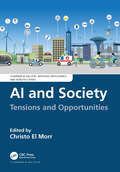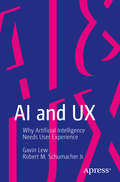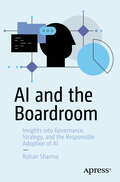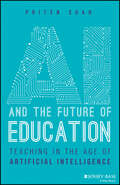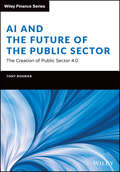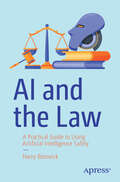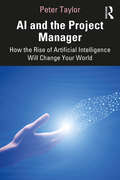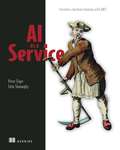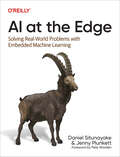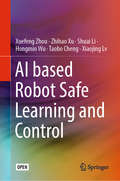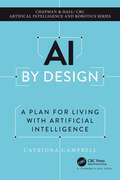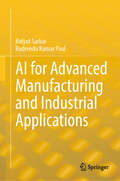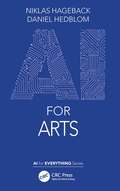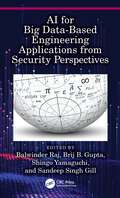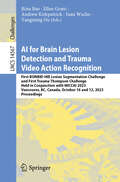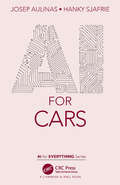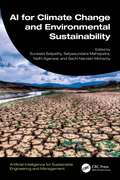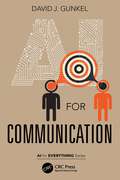- Table View
- List View
AI and Machine Learning for On-Device Development: A Programmer's Guide
by Laurence MoroneyAI is nothing without somewhere to run it. Now that mobile devices have become the primary computing device for most people, it's essential that mobile developers add AI to their toolbox. This insightful book is your guide to creating and running models on popular mobile platforms such as iOS and Android.Laurence Moroney, lead AI advocate at Google, offers an introduction to machine learning techniques and tools, then walks you through writing Android and iOS apps powered by common ML models like computer vision and text recognition, using tools such as ML Kit, TensorFlow Lite, and Core ML. If you're a mobile developer, this book will help you take advantage of the ML revolution today.Explore the options for implementing ML and AI on mobile devicesCreate ML models for iOS and AndroidWrite ML Kit and TensorFlow Lite apps for iOS and Android, and Core ML/Create ML apps for iOSChoose the best techniques and tools for your use case, such as cloud-based versus on-device inference and high-level versus low-level APIsLearn privacy and ethics best practices for ML on devices
AI and Metaverse: Volume 2 (Studies in Computational Intelligence #1160)
by Roger Lee Jongbae Kim Gwangyoung GimThe book reports the state-of-the-art results in Artificial Intelligence and Metaverse in both printed and electronic form. Studies in Computation Intelligence (SCI) has grown into the most comprehensive computational intelligence research forum available in the world. This book publishes original papers on both theory and practice that address foundations, state-of-the-art problems and solutions, and crucial challenges.
AI and Multimodal Services – AIMS 2024: 13th International Conference, Held as Part of the Services Conference Federation, SCF 2024, Bangkok, Thailand, November 16–19, 2024, Proceedings (Lecture Notes in Computer Science #15421)
by Mengxing Huang Liang-Jie Zhang Xiuqin Pan Jiajia Zhang Junyang ChenThis book constitutes the refereed proceedings of the 13th International Conference on AI and Multimodal Services – AIMS 2024, AIMS 2024, Held as Part of the Services Conference Federation, SCF 2024, held in Bangkok, Thailand, during November 16-19, 2024. The 7 full papers and one short paper included in this book were carefully reviewed and selected from 16 submissions. They were organized in topical sections as follows: research track; application track; and short paper track.
AI and Neuro-Degenerative Diseases: Insights and Solutions (Studies in Computational Intelligence #1131)
by Ajith Abraham Loveleen Gaur Reuel AjithThis book explores the current state of healthcare practice and provides a roadmap for harnessing artificial intelligence (AI) and other modern cognitive technologies for neurogenerative diseases. The main goal of this book is to look at how these techniques can be used to classify patients with neurodegenerative diseases by extracting data from multiple modalities. It demonstrates that the growing development of computer-aided diagnosis systems has a lot of potential to help with the diagnostic process. It offers an analysis of the prospective and perils in implementing such state of the art.Progressive brain disorders with a high prevalence in the general population include Parkinson's disease, Alzheimer's disease and other types of dementia, Huntington's disease, and motor neuron disease. Worldwide, it is estimated that 33 million people have Alzheimer's disease, and 10 million people have Parkinson's disease. The global health economy is significantly impacted by these disorders, which affect both the patient and the caregivers. Various diagnostic techniques are used for differential diagnoses, such as brain imaging, EEG analysis, molecular analysis, and cognitive, psychological, and physical examination. The book aims to develop effective treatments, enhance patient quality of life, and extend life expectancy. It focuses on novel artificial intelligence approaches to clarify the pathogenesis of neurodegenerative disorders and provide early diagnosis.The authors compile recent developments based on machine learning and deep learning techniques to diagnose neurodegenerative diseases using imaging, genetic, and clinical data. The authors support initiatives and methods that aim to improve the application of algorithms in diagnostic practice.
AI and Robotic Technology in Materials and Chemistry Research
by Xi ZhuA singular resource for researchers seeking to apply artificial intelligence and robotics to materials science In AI and Robotic Technology in Materials and Chemistry Research, distinguished researcher Dr. Xi Zhu delivers an incisive and practical guide to the use of artificial intelligence and robotics in materials science and chemistry. Dr. Zhu explains the principles of AI from the perspective of a scientific researcher, including the challenges of applying the technology to chemical and biomaterials design. He offers concise interviews and surveys of highly regarded industry professionals and highlights the interdisciplinary and broad applicability of widely available AI tools like ChatGPT. The book covers computational methods and approaches from algorithms, models, and experimental data systems, and includes case studies that showcase the real-world applications of artificial intelligence and lab automation in a variety of scientific research settings from around the world. You'll also find: A thorough introduction to the challenges currently being faced by chemists and materials science researchers Comprehensive explorations of autonomous laboratories powered by artificial intelligence and robotics Practical discussions of a blockchain-powered anti-counterfeiting experimental data system in an autonomous laboratory In-depth treatments of large language models as applied to autonomous materials research Perfect for materials scientists, analytical chemists, and robotics engineers, AI and Robotic Technology in Materials and Chemistry Research will also benefit analytical and pharmaceutical chemists, computer analysts, and other professionals and researchers with an interest in artificial intelligence and robotics.
AI and Robotics in Disaster Studies (Disaster Research and Management Series on the Global South)
by T. V. Vijay Kumar Keshav SudThis book promotes a meaningful and appropriate dialogue and cross-disciplinary partnerships on Artificial Intelligence (AI) in governance and disaster management. The frequency and the cost of losses and damages due to disasters are rising every year. From wildfires to tsunamis, drought to hurricanes, floods to landslides combined with chemical, nuclear and biological disasters of epidemic proportions has increased human vulnerability and ecosystem sustainability. Life is not as it used to be and governance to manage disasters cannot be a business as usual. The quantum and proportion of responsibilities with the emergency services has increased many times to strain them beyond their human capacities. Its time that the struggling disaster management services get supported and facilitated by new technology of combining Artificial Intelligence (AI) and Machine Learning (ML) with Data Analytics Technologies (DAT)to serve people and government in disaster management. AI and ML have advanced to a state where they could be utilized for many operations in disaster risk reduction. Even though many disasters cannot be prevented and a number of them are blind natural disasters yet through an appropriate application of AI and ML quick predictions, vulnerability identification and classification of relief and rescue operations could be achieved.
AI and SWARM: Evolutionary Approach to Emergent Intelligence
by Hitoshi IbaThis book provides theoretical and practical knowledge on AI and swarm intelligence. It provides a methodology for EA (evolutionary algorithm)-based approach for complex adaptive systems with the integration of several meta-heuristics, e.g., ACO (Ant Colony Optimization), ABC (Artificial Bee Colony), and PSO (Particle Swarm Optimization), etc. These developments contribute towards better problem-solving methodologies in AI. The book also covers emerging uses of swarm intelligence in applications such as complex adaptive systems, reaction-diffusion computing, and diffusion-limited aggregation, etc. Another emphasis is its real-world applications. We give empirical examples from real-world problems and show that the proposed approaches are successful when addressing tasks from such areas as swarm robotics, silicon traffics, image understanding, Vornoi diagrams, queuing theory, and slime intelligence, etc. Each chapter begins with the background of the problem followed by the current state-of-the-art techniques of the field, and ends with a detailed discussion. In addition, the simulators, based on optimizers such as PSO and ABC complex adaptive system simulation, are described in detail. These simulators, as well as some source codes, are available online on the author’s website for the benefit of readers interested in getting some hands-on experience of the subject. The concepts presented in this book aim to promote and facilitate the effective research in swarm intelligence approaches in both theory and practice. This book would also be of value to other readers because it covers interdisciplinary research topics that encompass problem-solving tasks in AI, complex adaptive systems, and meta-heuristics.
AI and Society: Tensions and Opportunities (Chapman & Hall/CRC Artificial Intelligence and Robotics Series)
by Christo El MorrAI's impact on human societies is and will be drastic in so many ways. AI is being adopted and implemented around the world, and government and universities are investing in AI studies, research, and development. However, very little research exists about the impact of AI on our lives. This book will address this gap; it will gather reflections from around the world to assess the impact of AI on different aspects of society as well as propose ways in which we can address this impact and the research agendas needed.
AI and UX: Why Artificial Intelligence Needs User Experience
by Gavin Lew Robert M. Schumacher Jr.Shine a light on how user experience (UX) will play a significant role in adoption of AI technologies across industries. This book explores how AI must be developed within a UX framework. The authors start by asking the question “how do we make AI smarter?” You will then quickly realize that the tried and true techniques of AI have been all about getting smarter. While we are making massive inroads, these may not be making AI more successful. It is not just about getting a product to market; it is—as always—about getting the product into people’s hands in a form that will be used. That demands examining the product from the perspective of the user—a stage of product development we have come to accept as fundamental. But the new world of AI will necessitate a new “UX lens” for us to see through. We should be asking the questions that will get us to that new lens. This book is based on interviews on technologists in the field of AI and UX. It is comprised of three core areas: 1) The history of AI, 2) Product examples and failures, and 3) A UX framework to make AI successful. What You'll Learn Understand how the usage and success of AI depends on a great user experience Discover how technology can advance beyond “it works” to “it works well,” which subsequently increases its adoptionDetermine what ways can we let the users enhance the data to make AI better attuned to their needsRealize how you can make humans smarter in their interactions with AI Who This Book Is For Those interested in AI and future implications; these can be futurists, technophiles, or product designers and product managers working on AI products
AI and the Boardroom: Insights into Governance, Strategy, and the Responsible Adoption of AI
by Rohan SharmaDevelop and implement AI strategies aligned with business goals, including operating models and partnership strategies. This book is practical guide for chief experience officers and other corporate board members faced with the complex issues of AI governance, data privacy, AI regulations, AI copyright, AI strategy, and more. Executives are eager to hear from other executives, peers, and authority figures regarding AI matters, and how to approach them quickly, correctly and meaningfully. The cost of missing out or messing up in AI transformation is easy so it’s imperative that C-suite and board members have the right mental framework to ask the right questions for their organizations. Throughout this book, you’ll see how to develop and execute AI strategies that align with your organizational goals and ethical standards. You’ll navigate the complex landscape of AI regulation and governance, applying best practices to ensure compliance and protect stakeholder interests. You’ll also, understand how to innovate and adapt AI technologies within your operations. AI and the Boardroom provides all the right tools to guide decision-making, foster partnerships, and enhance customer experiences What You Will Learn Master AI governance, regulations, and ethical considerations, including privacy and intellectual property issues. Optimize AI investments, budgets, and ROI through effective KPIs, OKRs, and risk management. Navigate organizational changes brought by AI, including executive compensation, team structures, and change management. Leverage AI for board-level decision-making while advancing organizational AI maturity and staying ahead of emerging trends. Who This Book Is For Suite executives and corporate board members; technology and innovation leaders; risk management and compliance professionals; corporate strategists and business unit leaders; AI program managers and data scientists
AI and the Future of Education: Teaching in the Age of Artificial Intelligence
by Priten ShahClear away the fog surrounding AI in education—and regain your peace of mind Among teachers, there is a cloud of rumors, confusion, and fear surrounding the rise of artificial intelligence. AI and the Future of Education is a timely response to this general state of panic, showing you that AI is a tool to leverage, not a threat to teaching and learning. By understanding what AI is, what it does, and how it can be used to enhance education, you can let go of anxiety and uncertainty, and learn to embrace artificial intelligence. It's true that, along with tremendous opportunities, AI presents some challenges for the field of education. In this book, Priten Shah, a Harvard M.Ed. with a robust background in educational innovation, helps you face these challenges head on, so you can gain the knowledge and skills you need to use AI effectively in your classroom. Thanks to this thorough consideration of ethical considerations and practical approaches, you can develop your own strategy for leveraging AI in administrative tasks, lesson design, professional development, and beyond. Understand what AI and machine learning are, and learn about new developments like ChatGPT Discover strategies for engaging students more fully using AI Automate administrative tasks, grading and feedback, and assessments Use AI in innovative ways to promote higher-order thinking skills Examine ethical considerations of AI, including the achievement gap, privacy concerns, and bias For K-12 educators, as well as leaders and policymakers who want to understand the role of technology in education, AI and the Future of Education is a valuable resource that can change AI from an unknown entity to an indispensable tool.
AI and the Future of the Public Sector: The Creation of Public Sector 4.0 (Wiley Finance)
by Tony BoobierDiscover how data, analytics, and AI will transform public services for the better In AI and the Future of the Public Sector: The Creation of Public Sector 4.0, renowned executive and consultant Tony Boobier delivers a comprehensive reference of the most relevant and central issues regarding the adoption and implementation of AI in the public sector. In the book, you&’ll find out why data and analytics are the solution to significant and ongoing problems in the public service relating to its ability to effectively provide services in an environment of reduced funding. You&’ll also discover the likely impact of future technological developments, like 5G and quantum computing, as well as explore the future of healthcare and the effective digitalization of the healthcare industry. The book also offers: Discussions of policing 4.0 and how data and analytics will transform public safety Explorations of the future of education and how ai can dramatically enhance educational standards while reducing costs Treatments of the internationalization of public services and its impact on agencies and departments everywhereA can&’t-miss resource for public sector employees at the managerial and professional levels, AI and the Future of the Public Sector is an insightful and timely blueprint to the effective use of artificial intelligence that belongs in the bookshelves of policy makers, academics, and public servants around the world.
AI and the Law: A Practical Guide to Using Artificial Intelligence Safely
by Harry BorovickLearn how to maximize your use of, and benefit from AI, personally and professionally while staying safe. To satisfy professionals and businesses trying to modernize their approaches to work and personal tasks, this book will explain some of the basics of what AI is, what AI is likely to look like in the near future, and how not to get stung using it. You’ll quickly realize that AI isn’t coming, it’s here, along with its opportunities and challenges. While some of the advantages of using AI tools may seem too good to be true, you’ll discover that the key to navigating the early stages of the AI era is to understand its guiding principles and then to prioritize the guidelines. The book features general situations and use cases to help you experience AI for fun and for work while retaining the benefits, profits, creations, outputs, and efficiencies of it. If you’re going to use AI in your daily career, whether as a student, creative, executive, marketer or in sales this book will help you understand how to bypass obstacles and get value from AI with the guidance of an AI and tech lawyer. What You Will Learn Identify, debunk, and protect against business and legal risk in the AI eraDiscuss these issues on a high level with CTOs and COOsSee how professionals can mutually use AI to their benefit Who This Book is For Anyone who wants to know whether AI is really going to change the world through the lens of their industry, or to simply understand how AI can be safely harnessed to maximize daily value while minimizing practical risks.
AI and the Project Manager: How the Rise of Artificial Intelligence Will Change Your World
by Peter TaylorEnabling project managers to adapt to the new technology of artificial intelligence, this first comprehensive book on the topic discusses how AI will reinvent the project world and allow project managers to focus on people. Studies show that by 2030, 80 percent of project management tasks, such as data collection, reporting, and predictive analysis, will be carried out by AI in a consistent and efficient manner. This book sets out to explore what this will mean for project managers around the world and equips them to embrace this technological advantage for greater project success. Filled with insights and examples from tech providers and project experts, this book is an invaluable resource for PMO leaders, change executives, project managers, programme managers, and portfolio managers. Anyone who is part of the global community of change and project leadership needs to accept and understand the fast- approaching AI technology, and this book shows how to use it to their advantage.
AI as a Service: Serverless machine learning with AWS
by Peter Elger Eóin ShanaghyAI as a Service is a practical handbook to building and implementing serverless AI applications, without bogging you down with a lot of theory. Instead, you&’ll find easy-to-digest instruction and two complete hands-on serverless AI builds in this must-have guide!Summary Companies everywhere are moving everyday business processes over to the cloud, and AI is increasingly being given the reins in these tasks. As this massive digital transformation continues, the combination of serverless computing and AI promises to become the de facto standard for business-to-consumer platform development—and developers who can design, develop, implement, and maintain these systems will be in high demand! AI as a Service is a practical handbook to building and implementing serverless AI applications, without bogging you down with a lot of theory. Instead, you&’ll find easy-to-digest instruction and two complete hands-on serverless AI builds in this must-have guide! Purchase of the print book includes a free eBook in PDF, Kindle, and ePub formats from Manning Publications. About the technology Cloud-based AI services can automate a variety of labor intensive business tasks in areas such as customer service, data analysis, and financial reporting. The secret is taking advantage of pre-built tools like Amazon Rekognition for image analysis or AWS Comprehend for natural language processing. That way, there&’s no need to build expensive custom software. Artificial Intelligence (AI), a machine&’s ability to learn and make predictions based on patterns it identifies, is already being leveraged by businesses around the world in areas like targeted product recommendations, financial forecasting and resource planning, customer service chatbots, healthcare diagnostics, data security, and more. With the exciting combination of serverless computing and AI, software developers now have enormous power to improve their businesses&’ existing systems and rapidly deploy new AI-enabled platforms. And to get on this fast-moving train, you don&’t have to invest loads of time and effort in becoming a data scientist or AI expert, thanks to cloud platforms and the readily available off-the-shelf cloud-based AI services! About the book AI as a Service is a fast-paced guide to harnessing the power of cloud-based solutions. You&’ll learn to build real-world apps—such as chatbots and text-to-speech services—by stitching together cloud components. Work your way from small projects to large data-intensive applications. What's inside - Apply cloud AI services to existing platforms - Design and build scalable data pipelines - Debug and troubleshoot AI services - Start fast with serverless templates About the reader For software developers familiar with cloud basics. About the author Peter Elger and Eóin Shanaghy are founders and CEO/CTO of fourTheorem, a software solutions company providing expertise on architecture, DevOps, and machine learning. Table of Contents PART 1 - FIRST STEPS 1 A tale of two technologies 2 Building a serverless image recognition system, part 1 3 Building a serverless image recognition system, part 2 PART 2 - TOOLS OF THE TRADE 4 Building and securing a web application the serverless way 5 Adding AI interfaces to a web application 6 How to be effective with AI as a Service 7 Applying AI to existing platforms PART 3 - BRINGING IT ALL TOGETHER 8 Gathering data at scale for real-world AI 9 Extracting value from large data sets with AI
AI at the Edge: Solving Real-World Problems with Embedded Machine Learning
by Daniel Situnayake Jenny PlunkettEdge AI is transforming the way computers interact with the real world, allowing IoT devices to make decisions using the 99% of sensor data that was previously discarded due to cost, bandwidth, or power limitations. With techniques like embedded machine learning, developers can capture human intuition and deploy it to any target--from ultra-low power microcontrollers to embedded Linux devices.This practical guide gives engineering professionals, including product managers and technology leaders, an end-to-end framework for solving real-world industrial, commercial, and scientific problems with edge AI. You'll explore every stage of the process, from data collection to model optimization to tuning and testing, as you learn how to design and support edge AI and embedded ML products. Edge AI is destined to become a standard tool for systems engineers. This high-level road map helps you get started.Develop your expertise in AI and ML for edge devicesUnderstand which projects are best solved with edge AIExplore key design patterns for edge AI appsLearn an iterative workflow for developing AI systemsBuild a team with the skills to solve real-world problemsFollow a responsible AI process to create effective products
AI based Robot Safe Learning and Control
by Shuai Li Xuefeng Zhou Zhihao Xu Hongmin Wu Taobo Cheng Xiaojing LvThis open access book mainly focuses on the safe control of robot manipulators. The control schemes are mainly developed based on dynamic neural network, which is an important theoretical branch of deep reinforcement learning. In order to enhance the safety performance of robot systems, the control strategies include adaptive tracking control for robots with model uncertainties, compliance control in uncertain environments, obstacle avoidance in dynamic workspace. The idea for this book on solving safe control of robot arms was conceived during the industrial applications and the research discussion in the laboratory. Most of the materials in this book are derived from the authors’ papers published in journals, such as IEEE Transactions on Industrial Electronics, neurocomputing, etc. This book can be used as a reference book for researcher and designer of the robotic systems and AI based controllers, and can also be used as a reference book for senior undergraduate and graduate students in colleges and universities.
AI by Design: A Plan for Living with Artificial Intelligence (Chapman & Hall/CRC Artificial Intelligence and Robotics Series)
by Catriona CampbellThis book introduces the reader to Artificial Intelligence and its importance to our future. Campbell uses behavioural psychology, explores technology, economics, real-life and historical examples to predict five future scenarios with AI. Illustrating through speculative fiction, she describes possible futures after AI exceeds human capabilities. We are at a tipping point in history and must plan to ensure a successful co-existence with artificial intelligence. This book explains how to design for a future with AI so that, rather than herald our downfall, it helps us achieve a new renaissance.
AI for Advanced Manufacturing and Industrial Applications
by Bidyut Sarkar Rudrendu Kumar PaulThis book provides a deep dive into the applications of Artificial Intelligence (AI) in advanced manufacturing and intelligent autonomous systems. Through real-world use cases and cutting-edge insights, it examines how AI, machine learning, IoT, and Industry 5.0 are revolutionizing manufacturing processes from end to end. Discover how integrating AI technologies with data analytics and IoT can unlock smarter, more efficient, and adaptable manufacturing solutions. Learn how predictive algorithms can foresee equipment failures, optimize inventory in real time, and enable autonomous robots to handle complex tasks, from assembly to logistics. With these innovations, manufacturers can achieve new levels of productivity, drive innovation, and create future-ready business models. Designed for industry practitioners, decision-makers, and aspiring professionals, this comprehensive guide offers actionable strategies and practical insights for implementing AI in advanced manufacturing. Whether you&’re a leader seeking to modernize operations or a graduate student aiming to enter this dynamic field, this book will empower you to navigate and leverage the next frontier of industrial innovation.
AI for Arts (AI for Everything)
by Niklas Hageback Daniel HedblomAI for Arts is a book for anyone fascinated by the man–machine connection, an unstoppable evolution that is intertwining us with technology in an ever-greater degree, and where there is an increasing concern that it will be technology that comes out on top. Thus, presented here through perhaps its most esoteric form, namely art, this unfolding conundrum is brought to its apex. What is left of us humans if artificial intelligence also surpasses us when it comes to art? The articulation of an artificial intelligence art manifesto is long overdue, so hopefully this book can fill a gap that will have repercussions not only for aesthetic and philosophical considerations but possibly more so for the development of artificial intelligence.
AI for Big Data-Based Engineering Applications from Security Perspectives
by Balwinder RajArtificial intelligence (AI), machine learning, and advanced electronic circuits involve learning from every data input and using those inputs to generate new rules for future business analytics. AI and machine learning are now giving us new opportunities to use big data that we already had, as well as unleash a whole lot of new use cases with new data types. With the increasing use of AI dealing with highly sensitive information such as healthcare, adequate security measures are required to securely store and transmit this information. This book provides a broader coverage of the basic aspects of advanced circuits design and applications. AI for Big Data-Based Engineering Applications from Security Perspectives is an integrated source that aims at understanding the basic concepts associated with the security of advanced circuits. The content includes theoretical frameworks and recent empirical findings in the field to understand the associated principles, key challenges, and recent real-time applications of advanced circuits, AI, and big data security. It illustrates the notions, models, and terminologies that are widely used in the area of Very Large Scale Integration (VLSI) circuits, security, identifies the existing security issues in the field, and evaluates the underlying factors that influence system security. This work emphasizes the idea of understanding the motivation behind advanced circuit design to establish the AI interface and to mitigate security attacks in a better way for big data. This book also outlines exciting areas of future research where already existing methodologies can be implemented. This material is suitable for students, researchers, and professionals with research interest in AI for big data–based engineering applications, faculty members across universities, and software developers.
AI for Brain Lesion Detection and Trauma Video Action Recognition: First BONBID-HIE Lesion Segmentation Challenge and First Trauma Thompson Challenge, Held in Conjunction with MICCAI 2023, Vancouver, BC, Canada, October 16 and 12, 2023, Proceedings (Lecture Notes in Computer Science #14567)
by Andrew Kirkpatrick Rina Bao Ellen Grant Juan Wachs Yangming OuThis book constitutes the proceedings of the First BONBID-HIE Lesion Segmentation Challenge and the First Trauma Thompson Challenge, held in conjunction with MICCAI 2023, in Vancouver, BC, Canada, during October 2023. For BONBID-HIE 2023 Challenge 6 papers have been accepted out of 14 submissions. They span a broad array of approaches leveraging anatomical information about HIE, data augmentation, training strategies, model architecture, and integration with traditional machine learning methods. For the TTC 2023 Trauma Thompson Challenge 4 accepted contributions are included in this book. They deal with advancements in machine learning methods and their practical applications in addressing small and diffuse lesions in HIE segmentation.
AI for Cars (AI for Everything)
by Hanky Sjafrie Josep AulinasArtificial Intelligence (AI) is undoubtedly playing an increasingly significant role in automobile technology. In fact, cars inhabit one of just a few domains where you will find many AI innovations packed into a single product. AI for Cars provides a brief guided tour through many different AI landscapes including robotics, image and speech processing, recommender systems and onto deep learning, all within the automobile world. From pedestrian detection to driver monitoring to recommendation engines, the book discusses the background, research and progress thousands of talented engineers and researchers have achieved thus far, and their plans to deploy this life-saving technology all over the world.
AI for Climate Change and Environmental Sustainability (Artificial Intelligence for Sustainable Engineering and Management)
by Suneeta Satpathy Sachi Nandan Mohanty Satyasundara Mahapatra Nidhi AgarwalThis book discusses the adverse effects of climatic changes on our planet. It examines AI-based tools and technologies and how they can assist in identifying energy emission reductions, CO2 removal, and support the development of greener transportation networks, monitoring deforestation, and forecasting extreme weather events.AI for Climate Change and Environmental Sustainability identifies and discusses in detail the importance of environmental sustainability based on accomplishment of the UN's 17 Sustainable Developmental Goals (SDGs). It presents the various AI-based possibilities for accelerating international efforts to safeguard the environment and conserve natural resources. The authors offer a comprehensive analysis of the emerging field of climate change in relation to Internet of Things, artificial intelligence, machine learning, and deep learning. The book discusses AI developments, applications, and best practices that will help us transition to a low-carbon future on both a regional and global scale. It provides case studies with analytical results pertinent to climate change and weather prediction and includes chapters with a research-oriented approach, which can encourage new developments in the field of sustainable climate and green environment.The book can be used as a primary textbook for graduate and postgraduate students in technology and science, as well as a reference for researchers, academics, and IT professionals working on climate change and sustainability initiatives.
AI for Communication (AI for Everything)
by David J. GunkelAI for Communication offers an engaging exploration into the diverse applications of artificial intelligence (AI) within the realm of communication. By bridging the gap between the scientific and engineering realms of AI and communication, this book reveals how AI, since its inception during the Dartmouth Summer workshop of 1956, has inherently been a science of communication. Exploring key advancements such as machine translation, natural language processing, large language models, computational creativity, and social robotics, this book shows how these innovations not only disrupt but also actively transform human communication.The book is designed for students, teachers, and general readers who want to know how the field of communication impacts and influences the theory and practice of AI and how recent developments in AI will affect all aspects of human social interaction.
